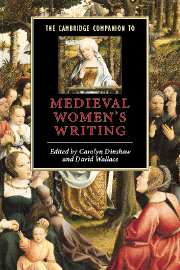3 - Marriage
from Part I - Estates of women
Published online by Cambridge University Press: 28 May 2006
Summary
Marriage contained and shaped the lives of the vast majority of the medieval populace of both sexes. By 1200, moreover, the jurisdiction over this quintessentially lay institution was firmly in the hands of the clergy, who were, by definition, male. This clerical/masculine primacy corresponds to the official ideology of marriage. As guardians of the institution, the clergy in no way challenged its traditional patriarchal structure. Although the Church would from time to time attempt to curb the more brutal manifestations of the husband's prerogatives over the wife, the reintroduction of Roman law into the canon law of the Church in the high Middle Ages tended to ratify the husband's position of authority.
The married woman’s position was additionally compromised by the clergy’s traditional bias in favour of celibacy, which assigned to marriage a less estimable position in the hierarchy of salvation than either virginity or chaste widowhood. The Middle Ages inherited the patristic reckoning which accorded virgins a hundred-fold reward in the kingdom of heaven, consecrated widows sixty-fold, and matrons a mere thirty-fold.1 Awareness of this distinction was ever present to the spiritually ambitious women of the period. Thus Christina of Markyate (died between 1155 and 1166), a daughter of well-to-do burghers who struggled to extricate herself from a forced marriage in order to preserve her virginity for Christ, gives an unassailable response to her clerical interlocutor’s contention that both matrons and virgins would be saved: ‘“Nor do I think that virgins only will be saved . . . [But] if many mothers of families are saved, which you likewise say, and it is true, certainly virgins are saved more easily.”’ Christina’s appreciation of the hierarchical relation of virgin to matron is repeatedly acknowledged by Chaucer’s Wife of Bath, albeit with humorous complacency.
- Type
- Chapter
- Information
- The Cambridge Companion to Medieval Women's Writing , pp. 40 - 57Publisher: Cambridge University PressPrint publication year: 2003
- 1
- Cited by



